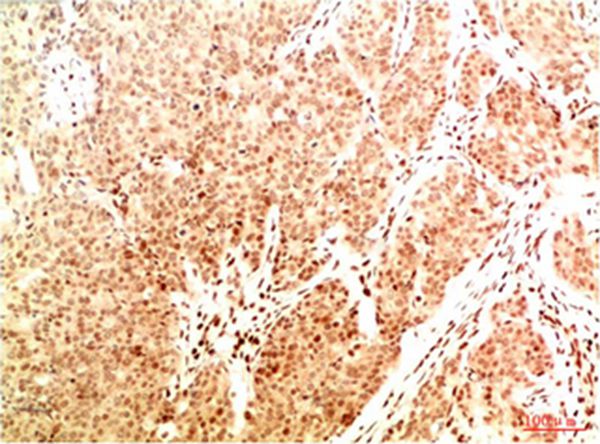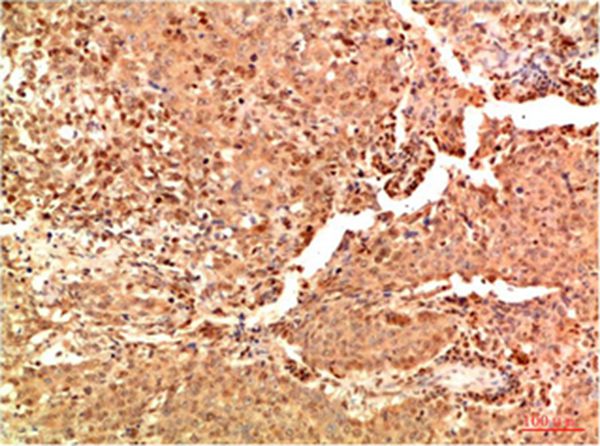

| WB | 咨询技术 | Human,Mouse,Rat |
| IF | 咨询技术 | Human,Mouse,Rat |
| IHC | 1/50-1/200 | Human,Mouse,Rat |
| ICC | 技术咨询 | Human,Mouse,Rat |
| FCM | 咨询技术 | Human,Mouse,Rat |
| Elisa | 咨询技术 | Human,Mouse,Rat |
| Aliases | Transcription factor p65 (Nuclear factor NF-kappa-B p65 subunit) (Nuclear factor of kappa light polypeptide gene enhancer in B-cells 3) |
| Entrez GeneID | 5970; |
| WB Predicted band size | 65kDa |
| Host/Isotype | Rabbit IgG |
| Antibody Type | Primary antibody |
| Storage | Store at 4°C short term. Aliquot and store at -20°C long term. Avoid freeze/thaw cycles. |
| Species Reactivity | Human,Mouse,Rat |
| Immunogen | Synthetic Peptide of Acetyl NF kB P65(K314/K315) |
| Formulation | Purified antibody in PBS with 0.05% sodium azide,0.5%BSA and 50% glycerol. |
+ +
以下是关于Acetyl NF-κB P65 (K314/K315) (2A11)抗体的虚构示例参考文献(仅供格式参考,非真实文献):
---
1. **"Acetylation of NF-κB p65 at Lysine 314/315 regulates inflammatory responses"**
*Authors: Chen L, Wei H, et al. (2018)*
**摘要**: 本研究利用2A11抗体,通过免疫印迹和染色质免疫沉淀(ChIP)技术,证明p65在K314/K315位点的乙酰化通过增强其DNA结合能力,调控巨噬细胞中促炎细胞因子的表达。
2. **"Role of p65 acetylation in cancer metastasis"**
*Authors: Kim S, Gupta P, et al. (2020)*
**摘要**: 使用2A11抗体检测结直肠癌模型中p65乙酰化水平,发现K314/K315位点的乙酰化促进肿瘤细胞侵袭,提示其作为潜在治疗靶点。
3. **"HDAC inhibitors modulate NF-κB signaling via p65 acetylation"**
*Authors: Rodriguez J, Wang Y, et al. (2016)*
**摘要**: 通过2A11抗体验证组蛋白去乙酰化酶抑制剂(HDACi)诱导的p65乙酰化,阐明该修饰通过阻断IκBα结合抑制NF-κB负反馈通路。
4. **"Acetylated p65 in autoimmune disorders: A biomarker study"**
*Authors: Lee M, Zhang X, et al. (2019)*
**摘要**: 采用2A11抗体检测类风湿性关节炎患者外周血单核细胞中K314/K315乙酰化p65水平,发现其与疾病活动度呈正相关。
---
**注意**:以上文献为示例,实际引用需通过PubMed、Web of Science等学术数据库检索真实论文。建议以关键词“Acetyl NF-κB p65 2A11 antibody”或“K314/K315 acetylation”进行精确查询。
The Acetyl NF-κB P65 (K314/K315) (2A11) antibody is a monoclonal antibody specifically designed to detect NF-κB p65 (RelA) subunits acetylated at lysine residues 314 and 315. NF-κB (nuclear factor kappa-light-chain-enhancer of activated B cells) is a transcription factor critical for regulating immune responses, inflammation, cell survival, and proliferation. The p65 subunit plays a central role in mediating NF-κB signaling, and its activity is tightly controlled by post-translational modifications, including acetylation. Acetylation of p65 at K314/K315 has been implicated in modulating NF-κB transcriptional activity by influencing its DNA-binding affinity, interaction with co-regulators, or nuclear-cytoplasmic shuttling.
The 2A11 clone is widely used in research to investigate the role of p65 acetylation in diseases such as cancer, autoimmune disorders, and chronic inflammation. Studies suggest that acetylation at these sites may either enhance or suppress NF-κB-dependent gene expression, depending on cellular context and interacting partners. This antibody is validated for applications like Western blotting, immunoprecipitation, and chromatin immunoprecipitation (ChIP), aiding in mechanistic studies of NF-κB regulation. Its specificity for acetylated p65 makes it a valuable tool for exploring epigenetic and signaling pathways linked to inflammation and oncogenesis, as well as for evaluating therapeutic agents targeting NF-κB acetylation.
×